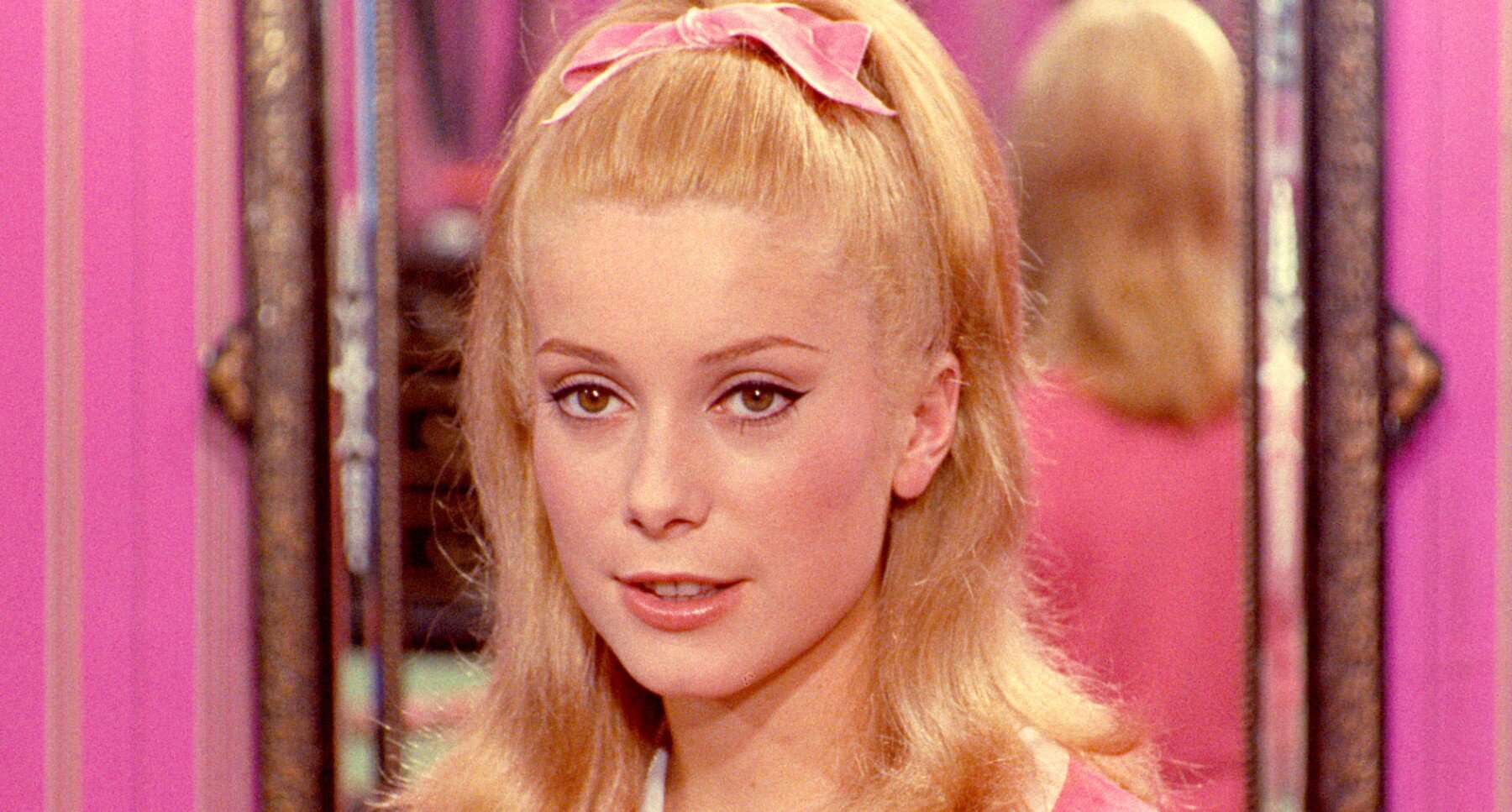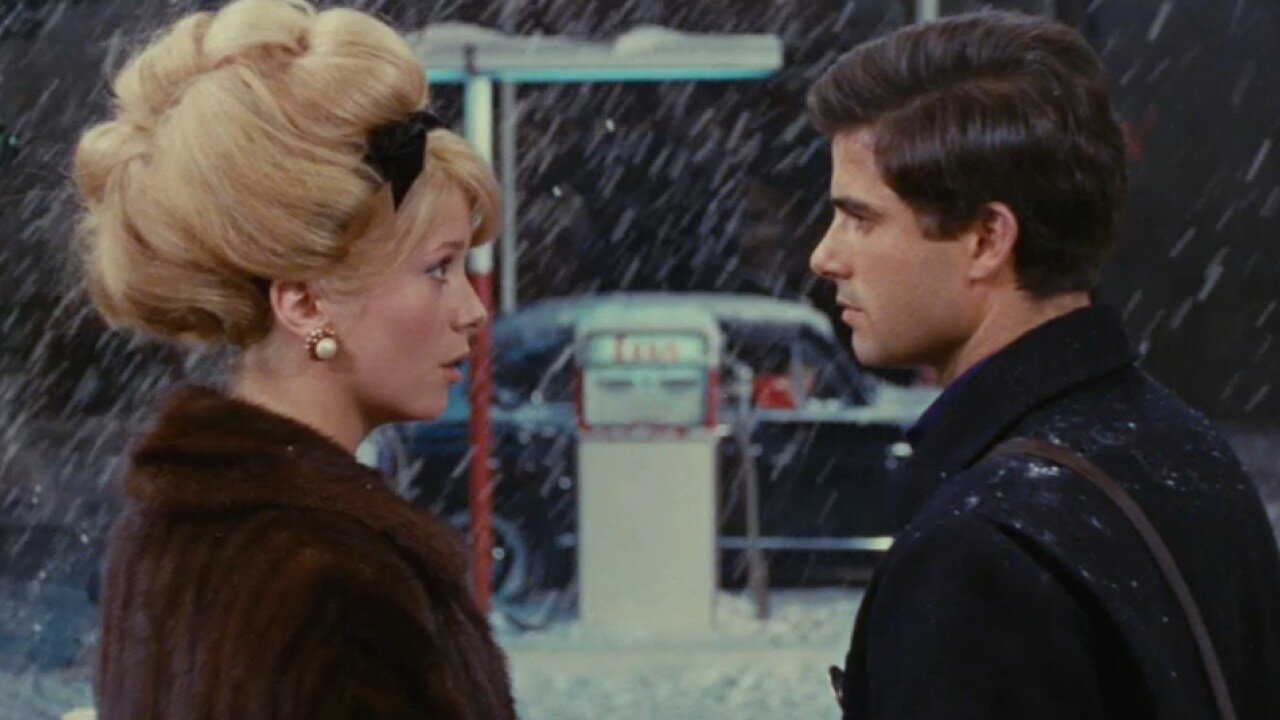Summary:
Lovers separated by war face life-altering decisions.
My Thoughts:
How does one describe a Jacques Demy movie to someone that hasn’t seen any of his films? Demy has made a few films that are the pique of delightful Technicolor musicals. His movies are bright and colorful; his stories, unique and heartwarming (or heartbreaking); and his music scores are absolutely divine. I’ve seen three of Demy’s films thus far, all of which have featured my favorite actress, the pulchritudinous Catherine Deneuve (“Repulsion”), but out of all of those, “Umbrellas” is by far my favorite. While “The Young Girls of Rochefort” provides some of the best music in his whole oeuvre (which, I might add, was incredibly influential to Damien Chazelle in his production of “La La Land”), and “Donkey Skin” provides a delightful spin on a classic French fairy tale, it’s this film that I’m drawn back to, over and over and over again.
“My little girl, you’re crazy! Thinking of marriage at sixteen!”
Lovers Genevieve (Deneuve) and Guy (Nino Castelnuovo, “The English Patient”) find themselves separated after Guy is called away to war. Meanwhile, an unforeseen circumstances thrusts Genevieve into a unstable situation, and her mother Madame Emery (Anne Vernon), insists that Genevieve forget about Guy and instead look to someone else whom might be able to provide for her.
There are many reasons for my unrequited love of this film, but the first reason is the music. “Umbrellas” is a touch unusual in that every single line of dialogue is sung (much like Tom Hooper’s 2012 version of “Les Miserable”, only the singing actually sounds good- sorry, Russell Crowe). The film, therefore, turns into one long continuous musical number with ups and downs in both the plot and chord progressions, and the result is simply dazzling. Some of the best songs in the film are just people singing to each other about what they plan to do later in the day or with their lives in the future; other great songs are simply conversations between mother and daughter or daughter and lover. I’ve only ever seen one other movie that sings every bit of dialogue from start to finish (the aforementioned “Les Miserable”), and this film worked far better for me than the latter. Maybe it was just because I could follow along with the subtitles, but I found the plot easy to understand, and the complexities of the characters and their emotions was really elevated by the music choices.
Another reason I love this movie so much is because of it’s mature and unconventional approach to dealing with love and how it fits into one’s life, and here I have to throw up a bit of a spoiler tag, for its rather hard to talk about the themes without first revealing some rather big plot points. If you’re just wondering whether or not you should watch this film, then, yes, you absolutely should.
(MAJOR SPOILERS FOLLOW)
After Guy leaves, Genevieve discovers she is pregnant with Guy’s child. At the same time, a man named Roland Cassard (Marc Michel, “Lola”) comes into Madame’s umbrella shop and seems interested in asking for Genevieve’s hand in marriage. As the story goes on, Genevieve finds herself drifting away from Guy. The film flashes forward to when Guy returns from the war, and he finds that Genevieve has left him. At first, he mopes around, but then, he finds someone else. The film flashes forward again and we see Guy with a family, now the owner of his own garage. In the final scene, Genevieve comes into the shop and has a brief encounter with Guy; the encounter is slightly awkward, but in it we feel the emotional turmoil that both of them must’ve gone through in arriving where they are in their lives now. That final scene is heartbreaking and wonderful at the same time.
Part of the beauty of this film is that it lets you, the viewer, put it together slowly that, perhaps Guy and Genevieve are too young to be together and this relationship, though tender and sweet, might not be the best thing for either of them; perhaps they need to spend some time away from one another and do a bit of growing up. These themes are bittersweet, but, in my opinion, they seem more reflective of actual life. I’m sure you remember, dear reader, your first love; that fluttery-light feeling that seemed to accompany you everywhere you went. It felt as if you’d achieved an understanding of ennui, and nothing could ever go wrong. Of course, most of those first loves wither and die, and for a time, we’re left feeling as if our hearts have frozen over, and no love will ever grow there again. But, life goes on, and eventually, the coldness of our hearts thaws, and, God willing, love finds a way to take root once more, perhaps to blossom into a love far more beautiful than our past loves ever were. That pattern in life lends itself to the bittersweet; you’ll always have some love for those ex-lovers, but, at the same time, sometimes you have to grow up and grow apart; that’s just life. Demy is able to capture that complex feeling of love lost and new love realized all in that final heart-tugging scene; it’s beautifully done and leaves the viewer with a profound appreciation for love and life itself.
Verdict:
I’ve tried not to oversell this movie, but I honestly think it’s in the top ten musicals ever made. The music is wonderful, the sets are gorgeous, the story itself tugs at your heartstrings, and the characters are nigh unforgettable; this is truly a magical movie, one that I recommend to everyone.
Review Written By:






